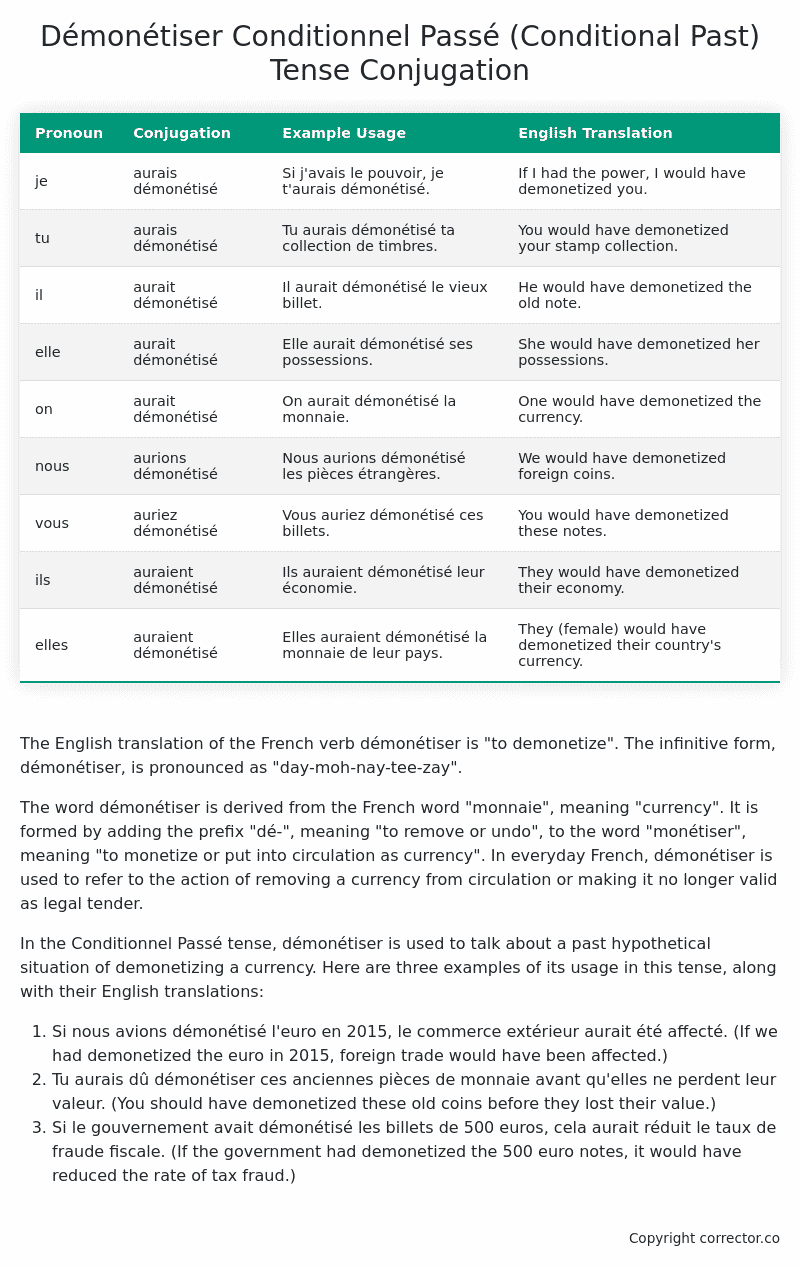Conditionnel Passé (Conditional Past) Tense Conjugation of the French Verb démonétiser
Introduction to the verb démonétiser
The English translation of the French verb démonétiser is “to demonetize”. The infinitive form, démonétiser, is pronounced as “day-moh-nay-tee-zay”.
The word démonétiser is derived from the French word “monnaie”, meaning “currency”. It is formed by adding the prefix “dé-“, meaning “to remove or undo”, to the word “monétiser”, meaning “to monetize or put into circulation as currency”. In everyday French, démonétiser is used to refer to the action of removing a currency from circulation or making it no longer valid as legal tender.
In the Conditionnel Passé tense, démonétiser is used to talk about a past hypothetical situation of demonetizing a currency. Here are three examples of its usage in this tense, along with their English translations:
- Si nous avions démonétisé l’euro en 2015, le commerce extérieur aurait été affecté. (If we had demonetized the euro in 2015, foreign trade would have been affected.)
- Tu aurais dû démonétiser ces anciennes pièces de monnaie avant qu’elles ne perdent leur valeur. (You should have demonetized these old coins before they lost their value.)
- Si le gouvernement avait démonétisé les billets de 500 euros, cela aurait réduit le taux de fraude fiscale. (If the government had demonetized the 500 euro notes, it would have reduced the rate of tax fraud.)
Table of the Conditionnel Passé (Conditional Past) Tense Conjugation of démonétiser
| Pronoun | Conjugation | Example Usage | English Translation |
|---|---|---|---|
| je | aurais démonétisé | Si j’avais le pouvoir, je t’aurais démonétisé. | If I had the power, I would have demonetized you. |
| tu | aurais démonétisé | Tu aurais démonétisé ta collection de timbres. | You would have demonetized your stamp collection. |
| il | aurait démonétisé | Il aurait démonétisé le vieux billet. | He would have demonetized the old note. |
| elle | aurait démonétisé | Elle aurait démonétisé ses possessions. | She would have demonetized her possessions. |
| on | aurait démonétisé | On aurait démonétisé la monnaie. | One would have demonetized the currency. |
| nous | aurions démonétisé | Nous aurions démonétisé les pièces étrangères. | We would have demonetized foreign coins. |
| vous | auriez démonétisé | Vous auriez démonétisé ces billets. | You would have demonetized these notes. |
| ils | auraient démonétisé | Ils auraient démonétisé leur économie. | They would have demonetized their economy. |
| elles | auraient démonétisé | Elles auraient démonétisé la monnaie de leur pays. | They (female) would have demonetized their country’s currency. |
Other Conjugations for Démonétiser.
Le Present (Present Tense) Conjugation of the French Verb démonétiser
Imparfait (Imperfect) Tense Conjugation of the French Verb démonétiser
Passé Simple (Simple Past) Tense Conjugation of the French Verb démonétiser
Passé Composé (Present Perfect) Tense Conjugation of the French Verb démonétiser
Futur Simple (Simple Future) Tense Conjugation of the French Verb démonétiser
Futur Proche (Near Future) Tense Conjugation of the French Verb démonétiser
Plus-que-parfait (Pluperfect) Tense Conjugation of the French Verb démonétiser
Passé Antérieur (Past Anterior) Tense Conjugation of the French Verb démonétiser
Futur Antérieur (Future Anterior) Tense Conjugation of the French Verb démonétiser
Subjonctif Présent (Subjunctive Present) Tense Conjugation of the French Verb démonétiser
Subjonctif Passé (Subjunctive Past) Tense Conjugation of the French Verb démonétiser
Subjonctif Imparfait (Subjunctive Imperfect) Tense Conjugation of the French Verb démonétiser
Conditionnel Présent (Conditional Present) Tense Conjugation of the French Verb démonétiser
Conditionnel Passé (Conditional Past) Tense Conjugation of the French Verb démonétiser (this article)
L’impératif Présent (Imperative Present) Tense Conjugation of the French Verb démonétiser
L’infinitif Présent (Infinitive Present) Tense Conjugation of the French Verb démonétiser
Struggling with French verbs or the language in general? Why not use our free French Grammar Checker – no registration required!
Get a FREE Download Study Sheet of this Conjugation 🔥
Simply right click the image below, click “save image” and get your free reference for the démonétiser Conditionnel Passé tense conjugation!

Démonétiser – About the French Conditionnel Passé (Conditional Past) Tense
Formation
Common Everyday Usage Patterns
Expressing Unreal Past Scenarios
Polite Requests or Suggestions
Expressing Doubt or Uncertainty
Interactions with Other Tenses
Conditional Present
Indicative Past Tenses
Conditional Future
Summary
Want More?
I hope you enjoyed this article on the verb démonétiser. Still in a learning mood? Check out another TOTALLY random French verb conjugation!


